Deck 2: Limits and the Derivative
Question
Question
Question
Question
Question
Question
Question
Question
Question
Question
Question
Question
Question
Question
Question
Question
Question
Question
Question
Question
Question
Question
Question
Question
Question
Question
Question
Question
Question
Question
Question
Question
Question
Question
Question
Question
Question
Question
Question
Question
Question
Question
Question
Question
Question
Question
Question
Question
Question
Question
Question
Question
Question
Question
Question
Question
Question
Question
Question
Question
Question
Question
Question
Question
Question
Question
Question
Question
Question
Question
Question
Question
Question
Question
Question
Question
Question
Question
Question
Question

Unlock Deck
Sign up to unlock the cards in this deck!
Unlock Deck
Unlock Deck
1/123
Play
Full screen (f)
Deck 2: Limits and the Derivative
1
Find the limit, if it exists.
Find:
A) - 24
B) 8
C) -8
D) 16
Find:

A) - 24
B) 8
C) -8
D) 16
-8
2
Find the limit, if it exists.
Let
A) 5
B) -7
C) -2
D) Does not exist
Let

A) 5
B) -7
C) -2
D) Does not exist
-7
3
Find the limit, if it exists.
Let

A) -∞
B) -4
C) 0
D) Does not exist
Let


A) -∞
B) -4
C) 0
D) Does not exist
Does not exist
4
Find the limit, if it exists.
Given
A)
B)
C)
D)
Given

A)

B)

C)

D)


Unlock Deck
Unlock for access to all 123 flashcards in this deck.
Unlock Deck
k this deck
5
The graph of a function f is given. Use the graph to answer the question.
Use the graph of f given below to find f(8).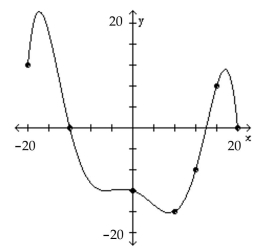
A) 8
B) 12
C) 0
D) -16
Use the graph of f given below to find f(8).

A) 8
B) 12
C) 0
D) -16

Unlock Deck
Unlock for access to all 123 flashcards in this deck.
Unlock Deck
k this deck
6
Find the limit, if it exists.
Find:
A)
B)
C) 0
D) Does not exist
Find:

A)

B)

C) 0
D) Does not exist

Unlock Deck
Unlock for access to all 123 flashcards in this deck.
Unlock Deck
k this deck
7
Find the limit, if it exists.
Let Find
Find 
A)
B) 4
C) -4
D) Does not exist
Let
 Find
Find 
A)

B) 4
C) -4
D) Does not exist

Unlock Deck
Unlock for access to all 123 flashcards in this deck.
Unlock Deck
k this deck
8
Find the limit, if it exists.
Let

A) -4
B) 0
C) 4
D) Does not exist
Let


A) -4
B) 0
C) 4
D) Does not exist

Unlock Deck
Unlock for access to all 123 flashcards in this deck.
Unlock Deck
k this deck
9
Find the limit, if it exists.
Find:
A) 1
B) 0
C) -1
D) Does not exist
Find:

A) 1
B) 0
C) -1
D) Does not exist

Unlock Deck
Unlock for access to all 123 flashcards in this deck.
Unlock Deck
k this deck
10
Find the limit, if it exists.
Find:
A) 0
B) -1
C) 1
D) Does not exist
Find:

A) 0
B) -1
C) 1
D) Does not exist

Unlock Deck
Unlock for access to all 123 flashcards in this deck.
Unlock Deck
k this deck
11
Use the graph to evaluate the indicated limit and function value or state that it does not exist.
Find
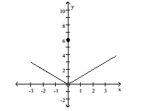
A) 6; 0
B) Does not exist; 6
C) 0; does not exist
D) 0; 6
Find


A) 6; 0
B) Does not exist; 6
C) 0; does not exist
D) 0; 6

Unlock Deck
Unlock for access to all 123 flashcards in this deck.
Unlock Deck
k this deck
12
Find the limit, if it exists.
Find:
A)
B) -11
C) 1
D)
Find:

A)

B) -11
C) 1
D)


Unlock Deck
Unlock for access to all 123 flashcards in this deck.
Unlock Deck
k this deck
13
Find the limit, if it exists.
Find:
A) 3
B) 10
C) 2
D) Does not exist
Find:

A) 3
B) 10
C) 2
D) Does not exist

Unlock Deck
Unlock for access to all 123 flashcards in this deck.
Unlock Deck
k this deck
14
Find the limit, if it exists.
Evaluate the following limit
A) 2
B)
C)
D) Does not exist
Evaluate the following limit

A) 2
B)

C)

D) Does not exist

Unlock Deck
Unlock for access to all 123 flashcards in this deck.
Unlock Deck
k this deck
15
Find the limit, if it exists.
Evaluate the following limit.
A) 2
B)
C)
D) Does not exist
Evaluate the following limit.

A) 2
B)

C)

D) Does not exist

Unlock Deck
Unlock for access to all 123 flashcards in this deck.
Unlock Deck
k this deck
16
Find the limit, if it exists.
Given
A)
B)
C)
D)
Given

A)

B)

C)

D)


Unlock Deck
Unlock for access to all 123 flashcards in this deck.
Unlock Deck
k this deck
17
Sketch a possible graph of a function that satisfies the given conditions.
f(0) = 6;
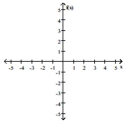
A)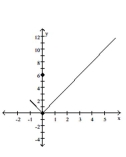
B)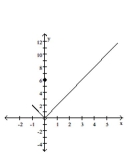
C)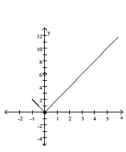
D)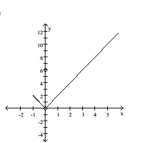
f(0) = 6;


A)

B)

C)

D)


Unlock Deck
Unlock for access to all 123 flashcards in this deck.
Unlock Deck
k this deck
18
Sketch a possible graph of a function that satisfies the given conditions.
f(1) = 4;
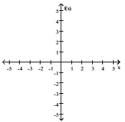
A)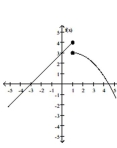
B)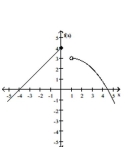
C)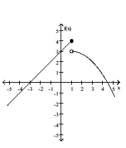
D)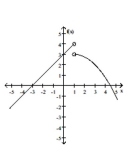
f(1) = 4;


A)

B)

C)

D)


Unlock Deck
Unlock for access to all 123 flashcards in this deck.
Unlock Deck
k this deck
19
Provide an appropriate response.
Given that Express the answer as a simplified fraction.
Express the answer as a simplified fraction.
A)
B)
C)
D)
Given that
 Express the answer as a simplified fraction.
Express the answer as a simplified fraction.A)

B)

C)

D)


Unlock Deck
Unlock for access to all 123 flashcards in this deck.
Unlock Deck
k this deck
20
Use the graph to evaluate the indicated limit and function value or state that it does not exist.
Find
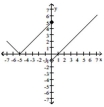
A) -1; 5
B) 5; -1
C) 5; Does not exist
D) Does not exist; does not exist
Find


A) -1; 5
B) 5; -1
C) 5; Does not exist
D) Does not exist; does not exist

Unlock Deck
Unlock for access to all 123 flashcards in this deck.
Unlock Deck
k this deck
21
Find the limit.
Determine the limit.
A)
B)
C) -2
D) 5
Determine the limit.

A)

B)

C) -2
D) 5

Unlock Deck
Unlock for access to all 123 flashcards in this deck.
Unlock Deck
k this deck
22
Solve the problem.
Suppose that the value V of a certain product decreases, or depreciates, with time t, in months, where

A) 16
B) 23
C) 7
D) 19
Suppose that the value V of a certain product decreases, or depreciates, with time t, in months, where


A) 16
B) 23
C) 7
D) 19

Unlock Deck
Unlock for access to all 123 flashcards in this deck.
Unlock Deck
k this deck
23
Use -∞ or ∞ where appropriate to describe the behavior at each zero of the denominator and identify all vertical
asymptotes.

A) No zeros of denominator; no vertical asymptotes
B) is a vertical asymptote
is a vertical asymptote
C) is a vertical asymptote
is a vertical asymptote
D) is a vertical asymptote
is a vertical asymptote
asymptotes.

A) No zeros of denominator; no vertical asymptotes
B)
 is a vertical asymptote
is a vertical asymptoteC)
 is a vertical asymptote
is a vertical asymptoteD)
 is a vertical asymptote
is a vertical asymptote
Unlock Deck
Unlock for access to all 123 flashcards in this deck.
Unlock Deck
k this deck
24
Use the given graph to find the indicated limit.
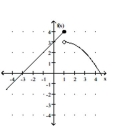

A)
B) 3
C) 4
D)


A)

B) 3
C) 4
D)


Unlock Deck
Unlock for access to all 123 flashcards in this deck.
Unlock Deck
k this deck
25
Solve the problem.
A company training program determines that, on average, a new employee can do P(x) pieces of work per day after s days of on-the-job training, where
A) 42
B) 105
C) 30
D) Does not exist
A company training program determines that, on average, a new employee can do P(x) pieces of work per day after s days of on-the-job training, where

A) 42
B) 105
C) 30
D) Does not exist

Unlock Deck
Unlock for access to all 123 flashcards in this deck.
Unlock Deck
k this deck
26
Use the given graph to find the indicated limit.
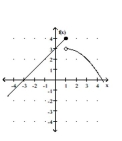

A)
B)
C) 4
D) 3


A)

B)

C) 4
D) 3

Unlock Deck
Unlock for access to all 123 flashcards in this deck.
Unlock Deck
k this deck
27
Provide an appropriate response.
If the limit at infinity exists, find the limit.
A)
B) 1
C)
D) 0
If the limit at infinity exists, find the limit.

A)

B) 1
C)

D) 0

Unlock Deck
Unlock for access to all 123 flashcards in this deck.
Unlock Deck
k this deck
28
Provide an appropriate response.
Find the vertical asymptote(s) of the graph of the given function.
A) y = -3
B) x = -8
C) x = -6
D) y = 8
Find the vertical asymptote(s) of the graph of the given function.

A) y = -3
B) x = -8
C) x = -6
D) y = 8

Unlock Deck
Unlock for access to all 123 flashcards in this deck.
Unlock Deck
k this deck
29
Provide an appropriate response.
If the limit at infinity exists, find the limit.
A)
B)
C)
D) 0
If the limit at infinity exists, find the limit.

A)

B)

C)

D) 0

Unlock Deck
Unlock for access to all 123 flashcards in this deck.
Unlock Deck
k this deck
30
Use the given graph to find the indicated limit.
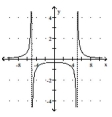

A) 0
B)
C)
D) 5


A) 0
B)

C)

D) 5

Unlock Deck
Unlock for access to all 123 flashcards in this deck.
Unlock Deck
k this deck
31
Find the limit.
Determine the limit.
A) 0
B)
C) -1
D)
Determine the limit.

A) 0
B)

C) -1
D)


Unlock Deck
Unlock for access to all 123 flashcards in this deck.
Unlock Deck
k this deck
32
Describe the end behavior of the function.

A)
B)
C)
D)

A)

B)

C)

D)


Unlock Deck
Unlock for access to all 123 flashcards in this deck.
Unlock Deck
k this deck
33
Solve the problem.
The cost of manufacturing a particular videotape is where x is the number of tapes produced. The average cost per tape, denoted by
where x is the number of tapes produced. The average cost per tape, denoted by  is found by dividing C(x) by x.
is found by dividing C(x) by x. 
A) 14
B) 6
C) 10
D) Does not exist
The cost of manufacturing a particular videotape is
 where x is the number of tapes produced. The average cost per tape, denoted by
where x is the number of tapes produced. The average cost per tape, denoted by  is found by dividing C(x) by x.
is found by dividing C(x) by x. 
A) 14
B) 6
C) 10
D) Does not exist

Unlock Deck
Unlock for access to all 123 flashcards in this deck.
Unlock Deck
k this deck
34
Use the given graph to find the indicated limit.
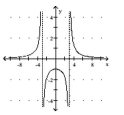

A)
B) 3
C)
D) 0


A)

B) 3
C)

D) 0

Unlock Deck
Unlock for access to all 123 flashcards in this deck.
Unlock Deck
k this deck
35
Provide an appropriate response.
Find the horizontal asymptote, if any, of the given function.
A) y = 1
B) x = 2, x = -2
C) y = 3, y = -4
D) None
Find the horizontal asymptote, if any, of the given function.

A) y = 1
B) x = 2, x = -2
C) y = 3, y = -4
D) None

Unlock Deck
Unlock for access to all 123 flashcards in this deck.
Unlock Deck
k this deck
36
Solve the problem.
Suppose that the value V of a certain product decreases, or depreciates, with time t, in months, where

A) 100
B) 30
C) 70
D) 85
Suppose that the value V of a certain product decreases, or depreciates, with time t, in months, where


A) 100
B) 30
C) 70
D) 85

Unlock Deck
Unlock for access to all 123 flashcards in this deck.
Unlock Deck
k this deck
37
Solve the problem.
Suppose that the cost C of removing p% of the pollutants from a chemical dumping site is given by Can a company afford to remove 100% of the pollutants? Explain.
Can a company afford to remove 100% of the pollutants? Explain.
A) Yes, the cost of removing p% of the pollutants is $400, which is certainly affordable.
B) No, the cost of removing p% of the pollutants is $400, which is a prohibitive amount of money.
C) Yes, the cost of removing p% of the pollutants is $40,000, which is certainly affordable.
D) No, the cost of removing p% of the pollutants increases without bound as p approaches 100.
Suppose that the cost C of removing p% of the pollutants from a chemical dumping site is given by
 Can a company afford to remove 100% of the pollutants? Explain.
Can a company afford to remove 100% of the pollutants? Explain.A) Yes, the cost of removing p% of the pollutants is $400, which is certainly affordable.
B) No, the cost of removing p% of the pollutants is $400, which is a prohibitive amount of money.
C) Yes, the cost of removing p% of the pollutants is $40,000, which is certainly affordable.
D) No, the cost of removing p% of the pollutants increases without bound as p approaches 100.

Unlock Deck
Unlock for access to all 123 flashcards in this deck.
Unlock Deck
k this deck
38
Provide an appropriate response.
Find the horizontal asymptote, if any, of the given function.
A) y = 0
B)
C)
D) None
Find the horizontal asymptote, if any, of the given function.

A) y = 0
B)

C)

D) None

Unlock Deck
Unlock for access to all 123 flashcards in this deck.
Unlock Deck
k this deck
39
Use -∞ or ∞ where appropriate to describe the behavior at each zero of the denominator and identify all vertical
asymptotes.

A) is a vertical asymptote
is a vertical asymptote
B) 6 is a vertical asymptote
6 is a vertical asymptote
C) is a vertical asymptote
is a vertical asymptote
D) is a vertical asymptote
is a vertical asymptote
asymptotes.

A)
 is a vertical asymptote
is a vertical asymptoteB)
 6 is a vertical asymptote
6 is a vertical asymptoteC)
 is a vertical asymptote
is a vertical asymptoteD)
 is a vertical asymptote
is a vertical asymptote
Unlock Deck
Unlock for access to all 123 flashcards in this deck.
Unlock Deck
k this deck
40
Provide an appropriate response.
Find the vertical asymptote(s) of the graph of the given function.
A) x = 9, x = -3
B) x = -9
C) x = 10, x = -10
D) y = 9, y = -3
Find the vertical asymptote(s) of the graph of the given function.

A) x = 9, x = -3
B) x = -9
C) x = 10, x = -10
D) y = 9, y = -3

Unlock Deck
Unlock for access to all 123 flashcards in this deck.
Unlock Deck
k this deck
41
Provide an appropriate response.
Use a sign chart to solve the inequality. Express answers in interval notation.
A)
B)
C)
D)
Use a sign chart to solve the inequality. Express answers in interval notation.

A)

B)

C)

D)


Unlock Deck
Unlock for access to all 123 flashcards in this deck.
Unlock Deck
k this deck
42
Provide an appropriate response.
Use a graphing utility to find the discontinuities of the given rational function.
A) 3
B) 1
C) -1
D) Continuous at all values of x
Use a graphing utility to find the discontinuities of the given rational function.

A) 3
B) 1
C) -1
D) Continuous at all values of x

Unlock Deck
Unlock for access to all 123 flashcards in this deck.
Unlock Deck
k this deck
43
Sketch a possible graph of a function that satisfies the given conditions.
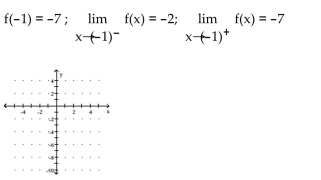
A)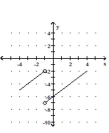
B)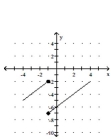
C)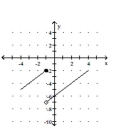
D)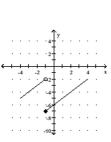

A)

B)

C)

D)


Unlock Deck
Unlock for access to all 123 flashcards in this deck.
Unlock Deck
k this deck
44
Sketch a possible graph of a function that satisfies the given conditions.
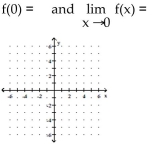
A)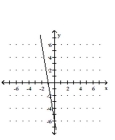
B)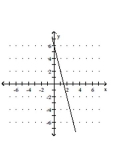
C)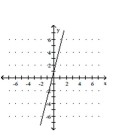
D)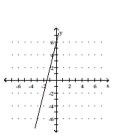

A)

B)

C)

D)


Unlock Deck
Unlock for access to all 123 flashcards in this deck.
Unlock Deck
k this deck
45
Provide an appropriate response.
Use a graphing utility to find the discontinuities of the given rational function.
A) 1
B) 3
C) -1
D) Continuous at all values of x
Use a graphing utility to find the discontinuities of the given rational function.

A) 1
B) 3
C) -1
D) Continuous at all values of x

Unlock Deck
Unlock for access to all 123 flashcards in this deck.
Unlock Deck
k this deck
46
Provide an appropriate response.
Use a sign chart to solve the inequality. Express answers in interval notation.
A)
B)
C)
D)
Use a sign chart to solve the inequality. Express answers in interval notation.

A)

B)

C)

D)


Unlock Deck
Unlock for access to all 123 flashcards in this deck.
Unlock Deck
k this deck
47
Solve the problem.
The cost of renting a snowblower is $20 for the first hour (or any fraction thereof) and $5 for each additional hour (or fraction thereof) up to a maximum rental time of 5 hours. Write a piecewise definition of the cost C(x)
Of renting a snowblower for x hours. Is C(x) continuous at x = 2.5?
A)
B)
C)
D)
The cost of renting a snowblower is $20 for the first hour (or any fraction thereof) and $5 for each additional hour (or fraction thereof) up to a maximum rental time of 5 hours. Write a piecewise definition of the cost C(x)
Of renting a snowblower for x hours. Is C(x) continuous at x = 2.5?
A)

B)

C)

D)


Unlock Deck
Unlock for access to all 123 flashcards in this deck.
Unlock Deck
k this deck
48
Find average rate of change for the function over the given interval.
 between x = 4 and x = 8
between x = 4 and x = 8
A) 9
B) 18
C) 14
D) 28
 between x = 4 and x = 8
between x = 4 and x = 8A) 9
B) 18
C) 14
D) 28

Unlock Deck
Unlock for access to all 123 flashcards in this deck.
Unlock Deck
k this deck
49
Provide an appropriate response.
Use a graphing utility to find the discontinuities of the given rational function.
A) 3
B) -1
C) 1
D) Continuous at all values of x
Use a graphing utility to find the discontinuities of the given rational function.

A) 3
B) -1
C) 1
D) Continuous at all values of x

Unlock Deck
Unlock for access to all 123 flashcards in this deck.
Unlock Deck
k this deck
50
Provide an appropriate response.
Determine where the function is continuous.
is continuous.
A)
B)
C)
D)
Determine where the function
 is continuous.
is continuous.A)

B)

C)

D)


Unlock Deck
Unlock for access to all 123 flashcards in this deck.
Unlock Deck
k this deck
51
Provide an appropriate response.
Solve the inequality and express the answer in interval notation:
A)
B)
C)
D)
Solve the inequality and express the answer in interval notation:

A)

B)

C)

D)


Unlock Deck
Unlock for access to all 123 flashcards in this deck.
Unlock Deck
k this deck
52
The graph of y = f(x) is shown. Use the graph to answer the question.
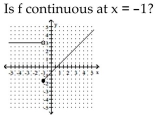
A) Yes
B) No

A) Yes
B) No

Unlock Deck
Unlock for access to all 123 flashcards in this deck.
Unlock Deck
k this deck
53
The graph of y = f(x) is shown. Use the graph to answer the question.
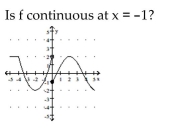
A) No
B) Yes

A) No
B) Yes

Unlock Deck
Unlock for access to all 123 flashcards in this deck.
Unlock Deck
k this deck
54
The graph of y = f(x) is shown. Use the graph to answer the question.
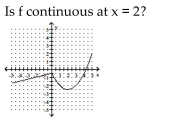
A) Yes
B) No

A) Yes
B) No

Unlock Deck
Unlock for access to all 123 flashcards in this deck.
Unlock Deck
k this deck
55
Provide an appropriate response.
Determine where the function is continuous.
is continuous.
A)
B)
C)
D)
Determine where the function
 is continuous.
is continuous.A)

B)

C)

D)


Unlock Deck
Unlock for access to all 123 flashcards in this deck.
Unlock Deck
k this deck
56
Find average rate of change for the function over the given interval.
Find the average rate of change for if x changes from 2 to 8.
if x changes from 2 to 8.
A) 7
B)
C)
D) 2
Find the average rate of change for
 if x changes from 2 to 8.
if x changes from 2 to 8.A) 7
B)

C)

D) 2

Unlock Deck
Unlock for access to all 123 flashcards in this deck.
Unlock Deck
k this deck
57
Provide an appropriate response.
Use a sign chart to solve the inequality. Express answers in interval notation.
A)
B)
C)
D)
Use a sign chart to solve the inequality. Express answers in interval notation.

A)

B)

C)

D)


Unlock Deck
Unlock for access to all 123 flashcards in this deck.
Unlock Deck
k this deck
58
Provide an appropriate response.
Use a graphing utility to approximate the partition numbers of the function to four decimal places:
A)
B)
C)
D)
Use a graphing utility to approximate the partition numbers of the function to four decimal places:

A)

B)

C)

D)


Unlock Deck
Unlock for access to all 123 flashcards in this deck.
Unlock Deck
k this deck
59
Find average rate of change for the function over the given interval.
 between x = -9 and x = -4
between x = -9 and x = -4
A)
B) 730
C)
D)
 between x = -9 and x = -4
between x = -9 and x = -4A)

B) 730
C)

D)


Unlock Deck
Unlock for access to all 123 flashcards in this deck.
Unlock Deck
k this deck
60
Provide an appropriate response.
Determine the x-values, if any, at which the function is discontinuous.
A) 1
B) -1, 0, 1
C) -1, 1
D) None
Determine the x-values, if any, at which the function is discontinuous.

A) 1
B) -1, 0, 1
C) -1, 1
D) None

Unlock Deck
Unlock for access to all 123 flashcards in this deck.
Unlock Deck
k this deck
61
Find the instantaneous rate of change for the function at the value given.
Find the instantaneous rate of change for the function
A) 6
B) -39
C) -14
D) -41
Find the instantaneous rate of change for the function

A) 6
B) -39
C) -14
D) -41

Unlock Deck
Unlock for access to all 123 flashcards in this deck.
Unlock Deck
k this deck
62
Provide an appropriate response.
Use the four step p

A) 10x + 5h - 3
B)
C) 5h - 3
D) 10x - 3
Use the four step p


A) 10x + 5h - 3
B)

C) 5h - 3
D) 10x - 3

Unlock Deck
Unlock for access to all 123 flashcards in this deck.
Unlock Deck
k this deck
63
List the x-values in the graph at which the function is not differentiable.
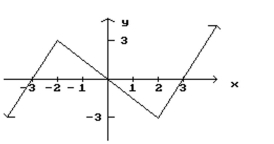
A) x = -3, x = 0, x = 3
B) x = -2, x = 0, x = 2
C) x = -2, x = 2
D) x = -3, x = 3

A) x = -3, x = 0, x = 3
B) x = -2, x = 0, x = 2
C) x = -2, x = 2
D) x = -3, x = 3

Unlock Deck
Unlock for access to all 123 flashcards in this deck.
Unlock Deck
k this deck
64
Provide an appropriate response.
Use the four step process to find for the function
for the function 
A)
B)
C)
D)
Use the four step process to find
 for the function
for the function 
A)

B)

C)

D)


Unlock Deck
Unlock for access to all 123 flashcards in this deck.
Unlock Deck
k this deck
65
Use the definition  to find the derivative at x.
to find the derivative at x.

A)
B)
C)
D)
 to find the derivative at x.
to find the derivative at x.
A)

B)

C)

D)


Unlock Deck
Unlock for access to all 123 flashcards in this deck.
Unlock Deck
k this deck
66
Provide an appropriate response.
Find the slope of the line tangent to the graph of the function at the given value of x.
A) 65
B) -52
C) -50
D) 67
Find the slope of the line tangent to the graph of the function at the given value of x.

A) 65
B) -52
C) -50
D) 67

Unlock Deck
Unlock for access to all 123 flashcards in this deck.
Unlock Deck
k this deck
67
Find average rate of change for the function over the given interval.
Find the average rate of change of y with respect to x if x changes from 3 to 5 in the function
A) 22
B) 11
C) 4
D) 9
Find the average rate of change of y with respect to x if x changes from 3 to 5 in the function

A) 22
B) 11
C) 4
D) 9

Unlock Deck
Unlock for access to all 123 flashcards in this deck.
Unlock Deck
k this deck
68
Solve the problem.
Suppose an object moves along the y-axis so that its location is at time x (y is in meters and x is in seconds). Find the average velocity for x changing from 3 to 3 + h seconds.
at time x (y is in meters and x is in seconds). Find the average velocity for x changing from 3 to 3 + h seconds.
A)
B) 7 - h m/s
C) 12 + h m/s
D) 7 + h m/s
Suppose an object moves along the y-axis so that its location is
 at time x (y is in meters and x is in seconds). Find the average velocity for x changing from 3 to 3 + h seconds.
at time x (y is in meters and x is in seconds). Find the average velocity for x changing from 3 to 3 + h seconds.A)

B) 7 - h m/s
C) 12 + h m/s
D) 7 + h m/s

Unlock Deck
Unlock for access to all 123 flashcards in this deck.
Unlock Deck
k this deck
69
List the x-values in the graph at which the function is not differentiable.
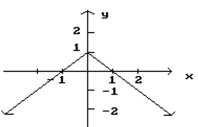
A) x = 0
B) x = 1
C) x = -1
D) x = 2

A) x = 0
B) x = 1
C) x = -1
D) x = 2

Unlock Deck
Unlock for access to all 123 flashcards in this deck.
Unlock Deck
k this deck
70
Use the definition  to find the derivative at x.
to find the derivative at x.

A)
B) 6 - 12x
C) -12x
D) 6 - 6x
 to find the derivative at x.
to find the derivative at x.
A)

B) 6 - 12x
C) -12x
D) 6 - 6x

Unlock Deck
Unlock for access to all 123 flashcards in this deck.
Unlock Deck
k this deck
71
Provide an appropriate response.
Find the slope of the secant line joining (2, f(2)) and (3, f(3)) for
A) 55
B) 15
C) -55
D) -15
Find the slope of the secant line joining (2, f(2)) and (3, f(3)) for

A) 55
B) 15
C) -55
D) -15

Unlock Deck
Unlock for access to all 123 flashcards in this deck.
Unlock Deck
k this deck
72
Find the equation of the tangent line to the curve when x has the given value.
Find the equation of the tangent line to the graph of the function at the given value of x.
A)
B)
C) y = - 39x - 80
D) y = 13x - 16
Find the equation of the tangent line to the graph of the function at the given value of x.

A)

B)

C) y = - 39x - 80
D) y = 13x - 16

Unlock Deck
Unlock for access to all 123 flashcards in this deck.
Unlock Deck
k this deck
73
Provide an appropriate response.
Use the four step process to find f'(x) for the function
A)
B)
C)
D)
Use the four step process to find f'(x) for the function

A)

B)

C)

D)


Unlock Deck
Unlock for access to all 123 flashcards in this deck.
Unlock Deck
k this deck
74
Provide an appropriate response.
Find the slope of the graph at the point (1, 2).
at the point (1, 2).
A) -1
B) -2
C) 2
D) 1
Find the slope of the graph
 at the point (1, 2).
at the point (1, 2).A) -1
B) -2
C) 2
D) 1

Unlock Deck
Unlock for access to all 123 flashcards in this deck.
Unlock Deck
k this deck
75
Find the instantaneous rate of change for the function at the value given.
Find the instantaneous rate of change for the function
A) 120
B) 15
C) 23
D) 16
Find the instantaneous rate of change for the function

A) 120
B) 15
C) 23
D) 16

Unlock Deck
Unlock for access to all 123 flashcards in this deck.
Unlock Deck
k this deck
76
Solve the problem.
Suppose an object moves along the y-axis so that its location is at time x (y is in meters and x is in seconds). Find the instantaneous velocity at x = 4 seconds.
at time x (y is in meters and x is in seconds). Find the instantaneous velocity at x = 4 seconds.
A) 9 m/s
B) 10 m/s
C) 8 m/s
D) 20 m/s
Suppose an object moves along the y-axis so that its location is
 at time x (y is in meters and x is in seconds). Find the instantaneous velocity at x = 4 seconds.
at time x (y is in meters and x is in seconds). Find the instantaneous velocity at x = 4 seconds.A) 9 m/s
B) 10 m/s
C) 8 m/s
D) 20 m/s

Unlock Deck
Unlock for access to all 123 flashcards in this deck.
Unlock Deck
k this deck
77
Provide an appropriate response.
 , find the slope of the tangent line at x = 4.
, find the slope of the tangent line at x = 4.
A) 20
B) 16
C) 8
D) 22
 , find the slope of the tangent line at x = 4.
, find the slope of the tangent line at x = 4.A) 20
B) 16
C) 8
D) 22

Unlock Deck
Unlock for access to all 123 flashcards in this deck.
Unlock Deck
k this deck
78
Solve the problem.
Suppose an object moves along the y-axis so that its location is at time x (y is in meters and x is in seconds). Find the average velocity (the average rate of change of y with respect to x) for x changing from 2 to
at time x (y is in meters and x is in seconds). Find the average velocity (the average rate of change of y with respect to x) for x changing from 2 to
9 seconds.
A) 12 m/s
B) 3 m/s
C) 15 m/s
D) 84 m/s
Suppose an object moves along the y-axis so that its location is
 at time x (y is in meters and x is in seconds). Find the average velocity (the average rate of change of y with respect to x) for x changing from 2 to
at time x (y is in meters and x is in seconds). Find the average velocity (the average rate of change of y with respect to x) for x changing from 2 to9 seconds.
A) 12 m/s
B) 3 m/s
C) 15 m/s
D) 84 m/s

Unlock Deck
Unlock for access to all 123 flashcards in this deck.
Unlock Deck
k this deck
79
Find the equation of the tangent line to the curve when x has the given value.

A) y = 14x - 46
B) y = -14x + 46
C) y = 7x + 46
D) y = -2x

A) y = 14x - 46
B) y = -14x + 46
C) y = 7x + 46
D) y = -2x

Unlock Deck
Unlock for access to all 123 flashcards in this deck.
Unlock Deck
k this deck
80
Use the definition  to find the derivative at x.
to find the derivative at x.
f(x) = 13x - 12
A) 13x
B) 1
C) 13
D) -13
 to find the derivative at x.
to find the derivative at x.f(x) = 13x - 12
A) 13x
B) 1
C) 13
D) -13

Unlock Deck
Unlock for access to all 123 flashcards in this deck.
Unlock Deck
k this deck


